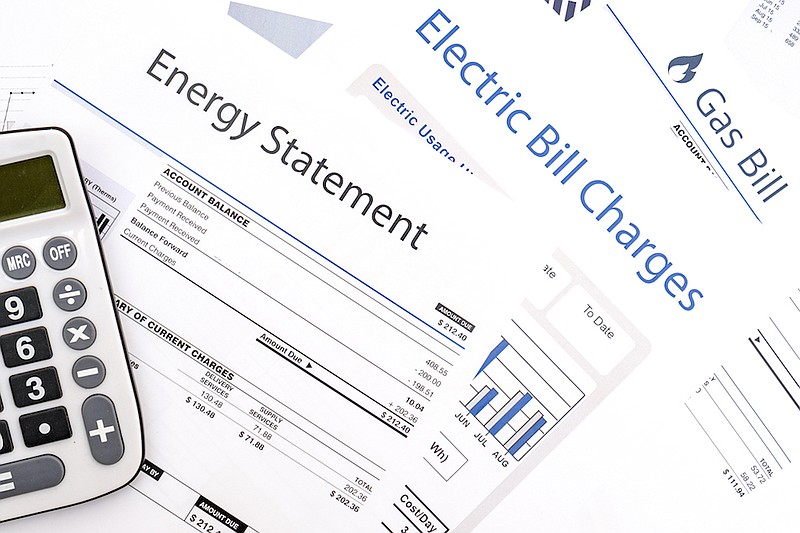Chattanooga agencies that assist low-income families with utility payments are preparing for an increase in requests for help as electric bills rise with the warmer weather - just as pandemic-related assistance that has softened the financial blow for many Chattanoogans struggling to pay their utility bills is running out.
Most local utilities suspended cutoffs for overdue payments at the start of the pandemic in March 2020, but resumed cutoffs toward the end of 2020. Chattanooga Gas resumed cutoffs for nonpayment on Sept. 28, as did EPB on Oct. 1 and Tennessee American Water on Oct. 7.
The number of Tennessee American Water customers for which the Hamilton County Water and Wastewater Treatment Authority has requested disconnection for nonpayment has increased by 25% over the past year, according to WWTA Director Michael Patrick. That's a loss of $368,000 that probably won't be recovered, and will most likely result in higher rates for all ratepayers, he said.
All utilities that provide water to WWTA customers aside from Tennessee American Water include sewer fees in customers' water bills, so Patrick could only provide numbers for its TAW customers.
EPB Vice President J. Ed. Marston said in a statement that the number of people whose service was cut off for nonpayment in the last 12 months is about half of what it was the previous 12 months, and the amount in unpaid bills written off by EPB in the past 12 months is also about half the amount written off in the previous 12 months.
He credits this to pandemic-related assistance such as the United Way of Greater Chattanooga's Restore Hope Fund, to which EPB, TVA and others contributed more than $788,906 to help provide utility, rent and other assistance to people affected by the pandemic.
According to the fund's most recent weekly report, a total of $826,753.61 had been distributed to 1,189 households, $190,994.33 of which was used for utilities.
Since donations to the fund are still being accepted, it is difficult to say when the fund will be depleted, United Way of Greater Chattanooga spokesperson Connor Tarter said. If distributions continue at the current rate, he estimates that the funds will last until the end of May.
"This is 11 months more than we originally expected this fund to cover at the start of the pandemic, which is a tremendous victory for the families and individuals who have continued to benefit from it over the past year," Tarter said. "The community support was incredible, both corporate and individual, and has allowed us to serve a tremendous number of households."
Tarter said that once Restore Hope funds are no longer available, United Way will continue to assist people in crisis through the Neediest Cases Fund, which provides one-time support of up to $500 through United Way partner agencies using donations made by Times Free Press readers. Donations amounted to nearly $80,000 during the annual appeal in November and December of 2020.
Having received support through Restore Hope Fund does not disqualify an individual or household from receiving assistance through Neediest Cases, he said.
Metropolitan Ministries, which provides assistance for utilities and rent to local households in need, paid out $464,592 in utility assistance since March 16, 2020. That's an increase of about 103% over the same time period the previous year, Executive Director Rebecca Whelchel said.
Last month, Metropolitan Ministries provided about $40,000 in utility assistance, because that's all the agency could afford, but it had requests for about 20 times that amount, Whelchel said.
"Most of the folks we're seeing now have never before asked anybody for help, so it's a very crowded field of customers in our business right now," she said. "I think there's going to continue to be an increase [in need], because even as the economy improves and jobs come back, the economic damage has been done, and folks are going to be playing catch up - or trying to play catch up - for years. This has changed the whole landscape."
Where to get help with utility bills
* EPB assistance: Call 423-648-1372.* Low Income Heating and Energy Assistance Program: Call 866-674-6327.* Metropolitan Ministries accepts phone calls for assistance Monday-Thursday starting at 9 a.m. for the first 20 callers. Call 423-624-9650 or 423-624-9654.* Tennessee American Water assistance: Call 1-800-272-1325.* United Way: Call 211, 423-265-8000 or 1-866-921-3035
As the moratorium on evictions expires at the end of June, that presents another challenge for low-income households struggling to pay bills. Most leases require tenants to maintain their utilities, and being disconnected gives landlords grounds for eviction even if the tenants are up-to-date on rent, Whelchel said.
Most of the landlords she works with are not much better off than their tenants, and if they fall behind on their mortgage payments, developers swoop in and the city loses more of its already-low supply of low-income housing, she said.
Whelchel's plan for meeting the increasing need is simply raising more money.
But that won't stop what is often the result of utility disconnections - eviction and the need for emergency shelter. She said the community should brace for an increase in homelessness and work to provide more emergency shelter in hotels, which are starting to fill up and charge more than they did earlier on in the pandemic.
In 2019, Metropolitan Ministries provided 62 households experiencing homelessness for the first time with emergency hotel space. In 2020, that number increased to 365 households.
Hamilton County's unsheltered homeless population grew by 81% over the past year, according to data gathered during the Chattanooga Regional Homeless Coalition's annual point-in-time count of area homeless people.
"It's not just your lights going out or your water being shut off; it's the snowball effect that that causes," Whelchel said.
Contact Emily Crisman at 423-757-6508 or ecrisman@timesfreepress.com.
